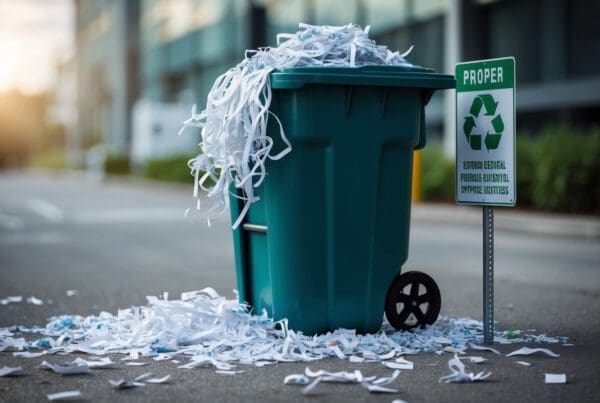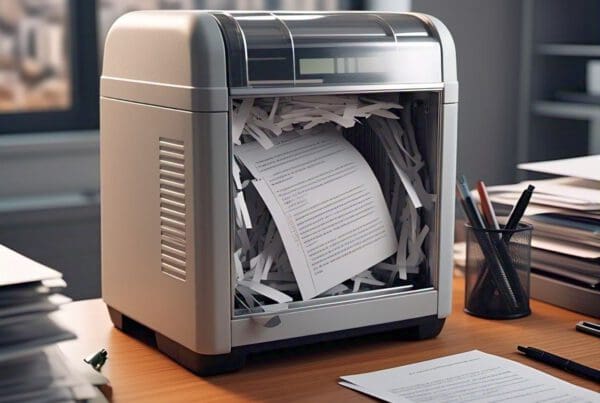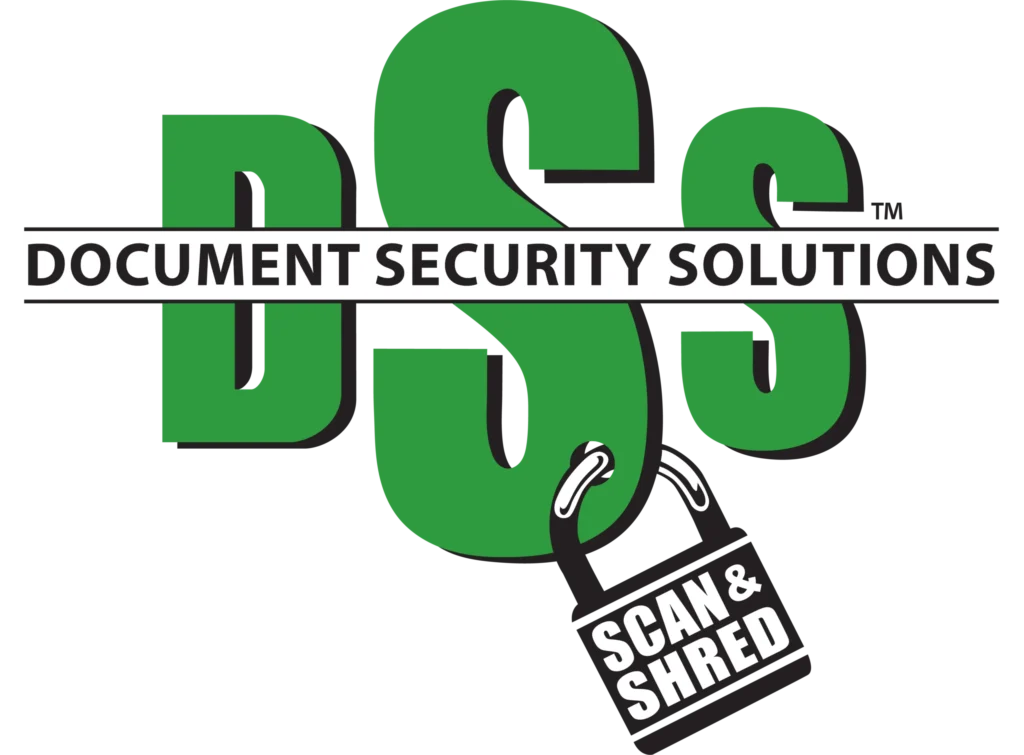Understanding Scheduled Shredding Services
Scheduled shredding services are key for maintaining security and privacy in any business. These services offer routine paper destruction, helping us protect sensitive information and prevent identity theft.
Benefits of Scheduled Shredding
Scheduled shredding services provide consistent protection against data theft. By setting a regular shredding schedule, companies can ensure that confidential documents are destroyed before they become a risk.
This approach also helps us manage paper waste efficiently. Instead of letting documents pile up, they are routinely shredded and disposed of properly. Scheduled shredding reduces legal risks tied to improper document disposal, preserving compliance with privacy laws.
Additionally, outsourcing shredding lets businesses focus on their core activities. Using professionals ensures that our shredding is handled securely and efficiently without burdening employees with extra tasks.
Distinguishing Scheduled and One-Time Shredding
Scheduled shredding offers regular service, whereas one-time shredding is a single event. We might choose one-time shredding when there’s a large backlog of documents or after a big project.
Scheduled service, by contrast, fits well for ongoing needs, like regular disposal of client records or financial documents. It ensures continual protection of sensitive information with minimal effort.
Costs can differ. Scheduled shredding can be more cost-effective over time. We get consistent service without the need to plan each shred separately. This lets us keep data security practices streamlined and predictable.
Implementing a Secure Shredding Process

When we set up a secure shredding process, we focus on selecting the right service, ensuring compliance with data laws, and obtaining necessary certifications. This helps us maintain the security and privacy of our documents effectively.
Selecting a Shredding Service
Choosing the right shredding service is crucial for secure document destruction. We start by researching companies that meet our needs.
Key factors to consider include:
- Security protocols: Look for services that offer on-site shredding or use securely locked bins for collection.
- Experience and reputation: Check reviews or ask for recommendations from businesses in similar industries.
A reliable service ensures that our documents are not only destroyed effectively but also securely handled throughout the process.
Ensuring Compliance with Data Protection Laws
Compliance with data protection laws is non-negotiable. We adhere to regulations like HIPAA and GDPR to avoid penalties and maintain customer trust. Our shredding process must align with these legal requirements:
- Data handling: Sensitive information is protected until it is destroyed.
- Audit trails: Keeping records of when and how data was destroyed.
It’s important for us to regularly review legal standards to ensure that our practices remain up-to-date and compliant.
Certificate of Destruction and NAID AAA Certification
Receiving a Certificate of Destruction after shredding reassures us that our documents were handled properly. This certificate serves as proof that data was securely destroyed. Working with a NAID AAA Certified company enhances our confidence even further. A NAID certification signifies that the service meets stringent security and operational standards.
By obtaining this certificate, we ensure accountability and provide evidence of our commitment to secure, compliant document destruction. Choosing partners with these credentials helps us maintain a trustworthy relationship with our clients and stakeholders.
Cost-Effective Strategies for Document Management
When managing documents efficiently, we can explore strategies that save money and optimize shredding. By adjusting the frequency of shredding and comparing different shredding methods, we achieve maximum cost-effectiveness without compromising security.
Optimizing Shredding Frequency for Cost Savings
Our first step is to determine how often we should schedule paper shredding. Too frequent, and costs rise unnecessarily; too infrequent, and clutter or security risks increase. We recommend evaluating our document disposal needs based on the volume of paper waste we produce.
For cost savings, many small businesses lean towards a scheduled shredding service. This ensures consistency and allows us to access bulk shredding service discounts. Balancing the schedule helps us maximize efficiency. Mobile shredding services bring flexibility, allowing us to match service to our flow of documents.
Comparing On-Site vs. Offsite Shredding Costs
We need to weigh on-site and offsite shredding costs. On-site options like a mobile shredding truck provide added security by shredding documents immediately, reducing the risk of data breaches. This method is often used by businesses handling sensitive information.
On the other hand, offsite shredding involves transporting documents to a facility. It can be cheaper for larger volumes with drop-off shredding. Comparing these options, we consider factors like the volume of shredding, sensitivity of documents, and our location to find what suits us best biologically.
By analyzing our specific needs and using a mix of these strategies, we manage our documents in a cost-effective way.
Enhancing Security and Protecting Against Risks
When using paper shredding services, we strengthen our defenses against identity theft and corporate espionage. Secure shredding also ensures the safe disposal of confidential information, minimizing risks.
Preventing Identity Theft and Corporate Espionage
Identity theft and corporate espionage are real threats. Professional shredding services are vital in curbing these risks. We use secure paper shredding to ensure sensitive information stays protected. By shredding documents thoroughly, we make it nearly impossible for thieves to piece them back together.
Legal penalties can arise if confidential information is mishandled. We avoid these by adhering to shredding standards ensuring documents are destroyed correctly. Our choice to use secure services means investing in peace of mind, knowing our information is not exposed to theft or misuse.
Secure Handling of Confidential Information
Confidential documents require careful handling from the moment they are created. We prioritize using shredding services that offer secure storage and transport until shredding occurs. This ensures confidentiality is maintained at every step.
It’s crucial to work with professionals who follow strict protocols for protecting sensitive documents. They use locked bins and secure vehicles for transporting papers, keeping our information safe from start to finish. By doing this, we protect our business interests and reduce the risk of data breaches.
Promoting Sustainability and Responsible Disposal
We aim to show how vital it is to integrate sustainability with secure disposal methods. Our focus is on the environmental benefits of shredding and its role in a circular economy.
Environmental Benefits of Professional Shredding
Professional shredding offers significant environmental benefits. By using secure document destruction, we reduce the amount of paper waste going to landfills. This practice decreases pollution and conserves natural resources.
Proper disposal methods, including media and electronic media destruction, prevent hazardous materials in hard drives from entering the ecosystem. Through environmental-friendly processes, we contribute to cleaner air and water. Additionally, shredding companies often recycle shredded materials, turning waste into reusable resources. This reduces the demand for raw materials, helping us fulfill our sustainability goals.
Supporting a Circular Economy with Secure Document Destruction
By supporting a circular economy, we encourage reuse and recycling. Secure document destruction ensures that materials are properly processed and reintegrated into production cycles. This prevents the need for new materials, saving energy and resources.
Our approach to document, media, and hard drive destruction includes recycling wherever possible. This minimizes waste and supports the idea of continuous use of resources. As we aim for sustainability, this process is crucial. Through responsible disposal, we help achieve a sustainable future while maintaining the security of sensitive information.





